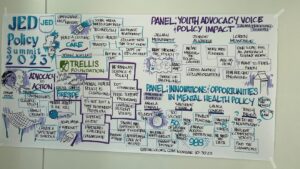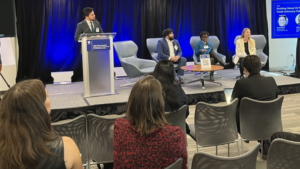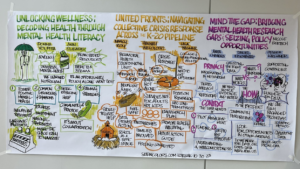NGA’s Jess Kirchner and Jillian Meinhardt highlighted the importance of youth mental health at The Jed Foundation’s 2023 Jed Policy Summit.

Thank you to The Jed Foundation for inviting Jess Kirchner and Jillian Meinhardt of the National Governors Association (NGA) to speak at the 2023 Jed Policy Summit: Shifting Student Mental Health from Advocacy to Action on October 30. It was an informative summit, featuring expert and stakeholder voices to support youth mental health throughout the country.
Jillian Meinhardt, Policy Analyst on the K-12 Education Team at NGA’s Center for Best Practices, spoke on the panel titled Nothing About Us Without Us, reflecting on youth voice and policy impact. This panel focused on understanding the importance of youth and stakeholder voice within the decision-making process at all levels, along with promising practices for strengthening youth mental health initiatives and policies.

Meinhardt highlighted the K-12 Education team’s recent Student and School Staff-Well-Being Project, which included a cohort of six states — Arkansas, Indiana, Michigan, North Dakota, Oregon and Wisconsin — addressing this issue. Two common findings throughout this work were the importance of cross-agency collaboration and family engagement when addressing youth mental health and well-being. The K-12 Education team recently began their second Student and School Staff Well-Being Project, working with Maine, New Hampshire, North Carolina, Oregon and Wyoming. Co-panelist Loren Muwonge, a high school senior, emphasized the value of youth voice. Muwonge previously participated as a panelist on the Framing from the Field Panel, at the Governors’ Education Policy Advisors Institute in Milwaukee, Wisconsin last month. NGA’s K-12 Education Team will continue to ensure that youth voice is an integral part of future meetings and projects.

Jessica Kirchner, Policy Analyst for the Children and Families team within the NGA Center for Best Practices, spoke on the panel titled Mind the Gap: Bridging Mental Health Research Gaps and Seizing Policy Opportunities. The panel explored the intersection between mental health research and policy development by identifying existing gaps and new opportunities to create evidence-based solutions to rising youth mental health concerns. Kirchner presented the state perspective, displaying examples from NGA members, and was joined by two leading researchers in youth behavioral health: Daniel Eisenberg, the Principal Investigator of the Healthy Minds Network, and Anita Chandra, Vice President and Director for the RAND Corporation’s Division of Social and Economic Well-Being. Moderated by Nicole Bertsch, a Principal for Williams & Jensen, panelists provided remarks about the importance of developing and maintaining a robust library of evidence for public-health level youth mental health policy solutions. Speaking from her role serving Governors, Kirchner shared the importance of research and advocacy groups helping to answer not just the “why” and the “what” of their research but provide states and territories with insight into “how” to implement these programs, through research into funding streams and governance. Discussion also shed light on challenges that states face when incorporating evidence-based practices into youth mental health policy. Key points included:

- The pace of government can impede a Governor’s ability to implement state-wide innovative practices at a pace that can keep up with cutting-edge research. Allowable uses of funds often cannot keep up with emerging research on clinical best practices.
- Federal funding streams for youth mental health are often delivered across several systems – education, child welfare, health, or juvenile justice. Each system has its own goals and regulations, which can significantly forestall efficient implementation. Governors benefit from program funding and design that allows for the development of targeted pilot programs.
- Efficiency is top of mind for state leaders, but many emerging practices in youth mental health may not yet have robust evaluation or outcome data. Governors are under pressure from their electorate to identify programs that represent the best use of state resources, which can be difficult to demonstrate in a space where evidence and data may be lagging.
Kirchner also highlighted The Jed Foundation’s critical influence in the development of Strengthening Youth Mental Health: A Governor’s Playbook, the capstone of New Jersey Governor Phil Murphy’s 2022-2023 NGA Chair’s Initiative on Strengthening Youth Mental Health. The Playbook presents more than 35 opportunities for Governors to strengthen youth mental health across the spectrum of prevention and treatment and across party lines and calls out more than 100 examples of current innovative programs led by states across the country.
This article was developed by Jess Kirchner and Jillian Meinhardt, for more information on Governors’ work on children and families, and K-12 education issues, please contact: communications@nga.org.













